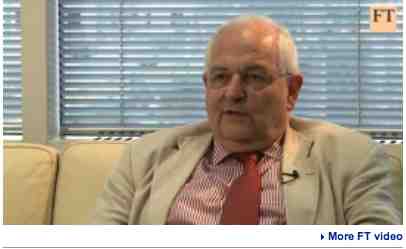 So many thundering op-eds to choose from on the subject that I instinctively cite the estimable Martin Wolf from the FT.
So many thundering op-eds to choose from on the subject that I instinctively cite the estimable Martin Wolf from the FT.
The opening:
To tighten or not to tighten – that is the question. It is one to which policymakers have started changing their answers. Are they right to do so? That is the issue addressed in the Financial Times this week, echoing the fierce debates of the 1930s. If arguments for tightening are correct, failure to do so would bring fiscal and financial shocks in some of the world’s most important countries. If arguments for tightening are false, decisions to do so threaten recovery and might trigger further financial shocks.
What has everyone agitated was the communique coming out of the recent G-20 that spoke of reducing public deficits by half by 2013.
So why the abrupt change after previous meets saw the 20 pledging whatever it took?
The first answer is that the world economy is recovering more strongly than expected. In April 2009, at the time of the London G20 summit, the consensus of forecasts for global economic growth this year was 1.9 per cent. By last September it had reached 2.6 per cent. By June 2010, it was 3.5 per cent. In the US, the consensus forecasts for 2010 were 1.8 per cent in April 2009, 2.4 per cent last September and 3.3 per cent in June 2010. Even for the eurozone, the consensus of forecasts has moved a little, from 0.3 per cent in April 2009, to 1 per cent last September and 1.1 per cent in June 2010.
The second answer is Greece, to put it simply.
Wolf covers the arguments:
At the anti-deficit extreme are those who argue fiscal deficits have no impact on activity since they lead to offsetting behaviour by private people. Thus, if governments run deficits, private people save, since they understand that their taxes will ultimately rise. Another, very different, extreme position comes from those who believe a deep slump would purge past excesses, and so lead to healthier economies and societies. While people who think in these radical ways influence the broader politics, they have limited direct influence on policymakers. So what is the latter debate about?
The “cutters” argue that such huge fiscal deficits – never seen in peacetime in big developed countries, notably the US – threaten long-term fiscal credibility and depress private confidence and spending. While piling fiscal stimulus on top of the built-in stabilisers made sense in the panic of 2008 and early 2009, the time has come for swift consolidation . . .
Finally, should economies weaken after a fiscal tightening, monetary loosening would be highly effective . . . Many cutters also argue that the best response would be to reduce spending. That is the lesson, they say, from past fiscal retrenchment.
The “postponers” agree there must be decisive slowing of the growth of long-term spending. But they emphasise the fragility of recovery and, in particular, the huge private sector financial surpluses. This private frugality has caused the fiscal deficits, they insist, not the other way round. The sequence of events makes that evident.
Moreover, add postponers, we have seen a strong flight to safety . . .
Moreover, postponers would add, with interest rates close to zero, monetary policy is ineffective, except to the extent that it supports fiscal loosening. Fortunately, countries with their own central banks can finance fiscal deficits directly. This is untrue for members of the eurozone, which are, in effect, operating with a foreign currency. So long as excess capacity remains so large and normal bank lending so weak, such reliance on the central bank “printing press” creates no inflationary danger. On the contrary, the danger is rather that premature fiscal tightening would trigger a sharp economic slowdown, as in Japan in the 1990s, so pitching important economies into deflation.
The interaction of high indebtedness with deflation could, they argue, create a downward spiral. A Japanese-style “lost decade” . . .
Wolf admits he sides with the postponers for now but says no one can be sure which side is correct for now. The answer, however, probably determines whether Obama is a one-termer or two.